Automotive Marketing Strategies 2024 + Retrospective of the 2023 Market

Auto Dealer Marketing Strategies in 2024
Examining the Challenges That Shaped the 2023 Automotive Industry and Exploring How These Factors Set the Stage for 2024
In 2023, the automotive industry faced challenges like record-high new vehicle prices, surging new and used car inventory, a 40-day strike against top Detroit automakers, and a significant rate interest hike by the Federal Reserve. This eBook summarizes the 2023 automotive market, and breaks down how last year's challenges will impact 2024 automotive marketing strategies for dealers.
Download the eBook

01
Unraveling 2023's Auto Market Challenges – Average Household Incomes Drop, Loan Rates Soar, and Smart Strategies for 2024 Dealerships
The 2023 automotive market faced economic challenges with soaring loan rates and declining household incomes. Amid predictions of rate cuts in 2024, the eBook advises dealerships to adapt marketing strategies, emphasizing cost-effective financing and the value proposition of vehicles. The key to success lies in a nuanced approach tailored to the evolving financial landscape. Click Here to See Why.
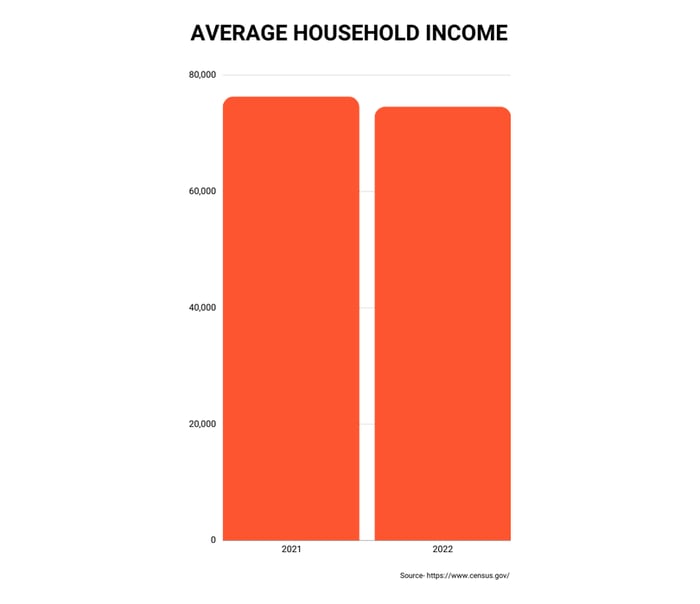
02
Boosting Customer Engagement by 30%, Elevating Efficiency with AI, and Maximizing Profitability through Inventory Mastery
Revolutionize success in 2024: Boost customer engagement by 30% with data-driven marketing, enhance efficiency with AI, and maximize profitability through strategic inventory management. Learn more about the roadmap to triumph in the automotive industry. Click Here to Read the Details.
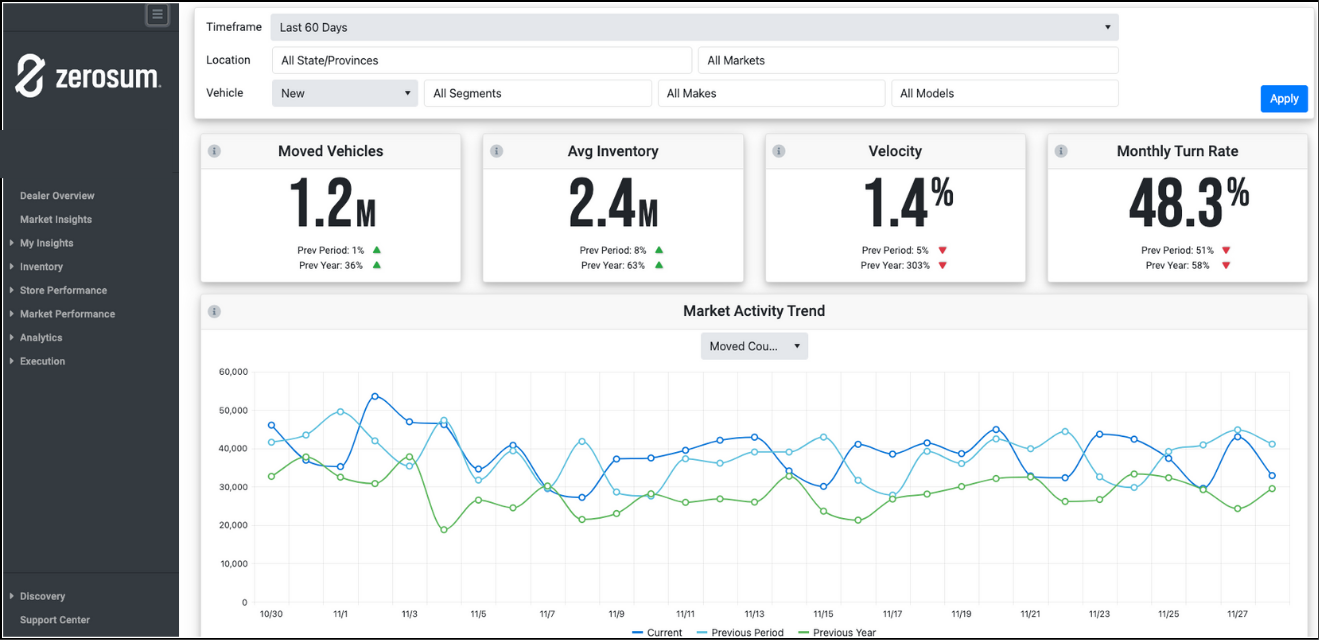
What Are Automotive Marketing Strategies?
Automotive marketing strategies encompass a comprehensive range of tactics and methodologies employed by car manufacturers, dealerships, and related businesses to promote and sell vehicles and automotive services. This multifaceted approach aims to connect with potential customers across various channels, leveraging traditional advertising mediums such as TV, radio, and print, alongside digital platforms like social media, email marketing, and search engine optimization (SEO). The goal is to build brand awareness, stimulate interest, and drive sales by emphasizing unique selling points, competitive advantages, and responding to consumer trends and preferences. Effective automotive marketing strategies incorporate a deep understanding of the target market, including demographic, geographic, and psychographic data, to tailor messages and offers that resonate with potential buyers, enhancing customer engagement and loyalty. In a rapidly evolving market, these strategies also adapt to incorporate emerging technologies and trends, such as electric vehicles and online car buying, ensuring that companies stay relevant and competitive.
Introduction
In 2023, the automotive industry navigated unexpected challenges, from record-high prices on new vehicles, a surge in new vehicle inventory (which has almost reached 3 million for the first time since the pandemic), and a historic strike. Despite the increased inventory, vehicle prices deterred many customers, leading to relatively static movement and increasing days-on-lot (according to ZeroSum's January 2024 State of the Dealer report). The used car market faced similar challenges, with the slowing down of new inventory in the latter half of 2023, static vehicle movement, and a significant 12.6% price drop compared to 2022.
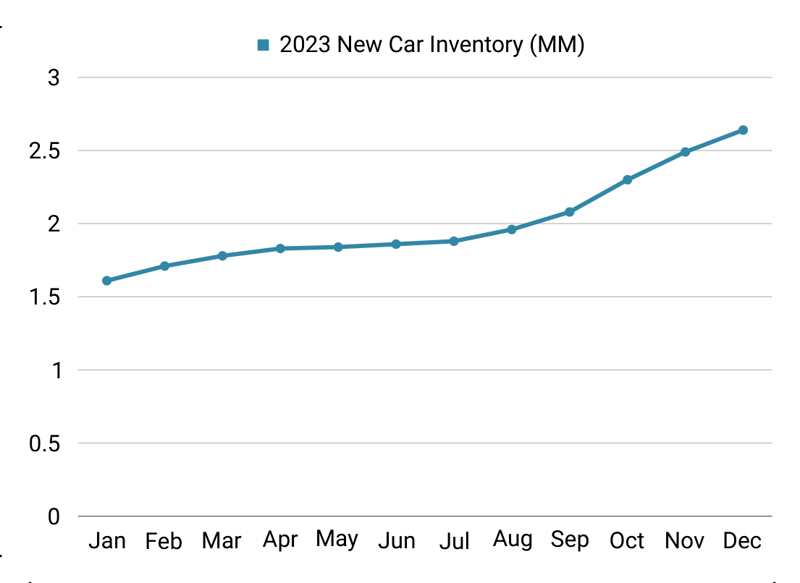
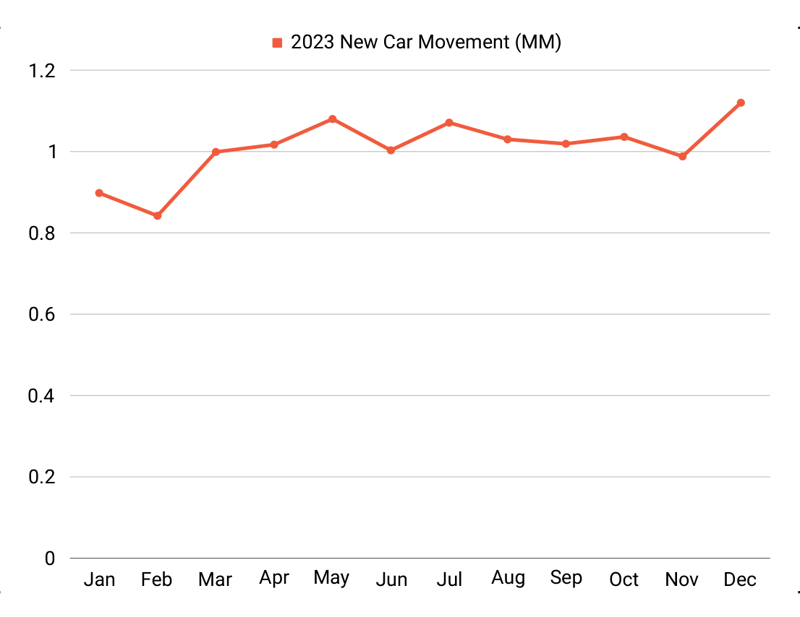
In 2023, used car prices dropped 12.6%
The industry experienced further setbacks with a simultaneous strike against the top three Detroit automakers, which was resolved after 40 days of intense negotiating. With that hurdle in the review mirror, the automotive sector is working diligently to try and meet government-imposed EV targets, which will require more than half of all new cars to be electric vehicles (EVs) by 2030. While EV sales are on the rise, concerns loom as demand struggles to keep pace with the rapidly expanding supply, casting uncertainty on the industry's ability to meet the ambitious 2030 target. As this eBook looks at dealership marketing trends for 2024, it also aims to provide a summary and proper understanding of the 2023 challenges and transformations that will impact 2024.
01
Automotive Market Dynamics
In 2023, the automotive market faced economic challenges with high-interest rates, rising vehicle prices, and declining household incomes. The average five-year new car loan rate rose to 7.71% in 2023, up from 4%, impacting consumers' monthly payments. With predictions pointing to potential rate cuts, it is estimated that the rate will drop slightly to an average of 7.0%-7.5% by the end of 2024. Despite expectations for rate decreases, financial strains will persist as inflation and supply chain disruptions are expected to result in continuing high ownership costs.
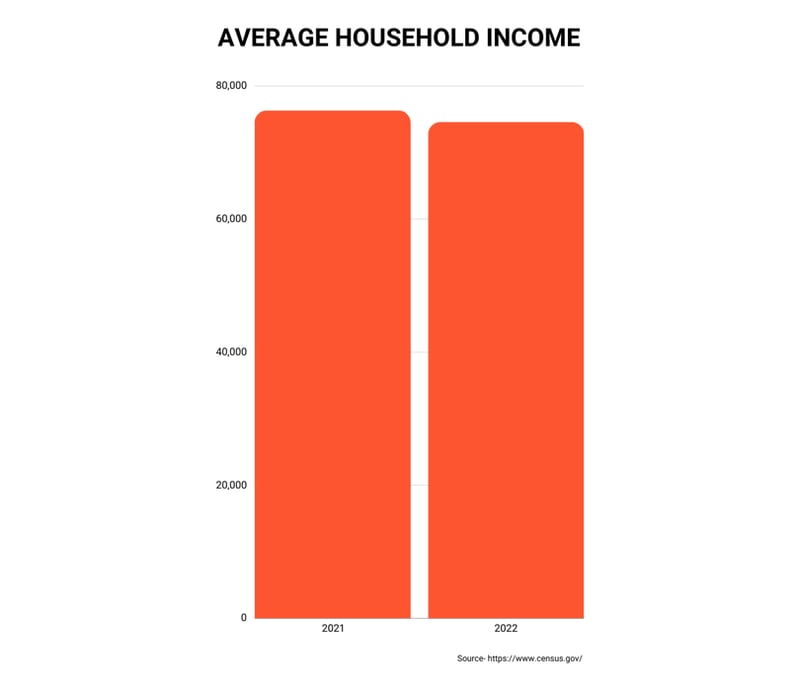
As the automotive industry grapples with these economic complexities, marketing strategies must adapt to changing conditions. In recognizing consumers' financial constraints, dealerships should emphasize cost-effective financing options, leveraging potential rate cuts and fostering competition among lenders.
Additionally, highlighting the value proposition of vehicles in terms of fuel efficiency, maintenance, and insurance costs can resonate with budget-conscious consumers. With dealership customers still facing inflation and economic uncertainty in 2024, a nuanced marketing approach that addresses the evolving financial landscape will be crucial for dealership success in the coming year.
While critical part shortages, particularly for computer chips, eased, the Federal Reserve's significant interest rate hikes intensified the financial burden for car buyers. Transportation costs, constituting 16% of typical household spending, escalated, and auto-loan delinquency rates reached a nearly three-decade high. In this environment owning a vehicle became more expensive, with the average monthly cost surging to $736 in 2023 and 17.5%, or more than 1 in 6 customers, paying over $1,000 monthly.
Car Inventory Supply and Car Dealer Advertising Costs
The 2023 landscape profoundly impacted dealership profitability. Despite witnessing a 5.8% increase in overall sales, dealerships experienced a substantial average drop in pretax profits. Fluctuating inventory, a significant decline in used vehicle values, rising interest rates, and persistent inflation contributed to this downturn and created a complex environment that demanded proactive strategies for dealerships to navigate successfully.
Despite witnessing a 5.8% increase in overall sales, dealerships experienced a substantial average drop in pretax profits
Analysis by Downey & Company, a CPA Firm in Boston, MA, revealed that the current market dynamics signaled a need for dealerships to reassess and revamp their sales and operational strategies. Given the variable inventory situation, efficient inventory management has become more crucial. With used vehicle values on a downward trend, dealerships had to recalibrate pricing strategies to remain competitive while maintaining profitability. The rise in interest rates raised concerns about affordability for the average dealership customer, emphasizing the necessity for diversified financial solutions to cater to a broader customer base.
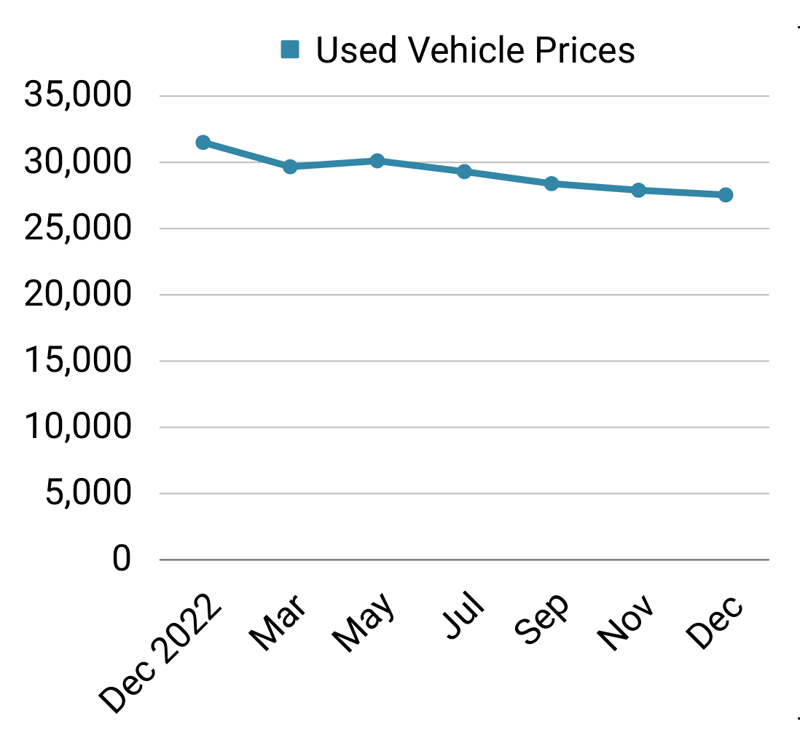
Financial insights and trends from Downey & Company's analysis depicted a stark 22.5% average drop in dealership profits, despite an overall sales increase of 5.8%, attributed to stabilizing vehicle prices. However, operating costs were on the rise, with over half of the dealerships reporting increased expenses in personnel and semi-fixed costs.
Further complicating the scenario, year-over-year new vehicle inventory growth surged from 1.64 million units in December 2022 to 2.64 million in December 2023, according to Cloud Theory's "On the Horizon" report. While this additional supply benefited consumers with more choices and controlled prices, it presented dealerships with the challenge of managing surplus inventory, directly impacting profitability.
As dealerships adapt to these unfamiliar market conditions, optimizing advertising spend is imperative amidst rising per-vehicle advertising costs. According to NADA, the average dealer spent $718 on advertising for each new vehicle sold in 2022, marking a 19% increase from the prior year. Dealerships should prioritize marketing efficiency, leveraging local market data to understand customer demographics and preferences. Additionally, recognizing the shift in consumer behavior towards used vehicles for a better price, and providing varied financial solutions to address affordability concerns, will be instrumental in maintaining dealership competitiveness and profitability throughout the 2024 auto market.

The average dealer spent $718 on advertising for each new vehicle sold in 2022...a 19% increase
As the automotive industry starts 2024, dealerships might find themselves at a crossroads. Despite the past few years bringing improvements in vehicle sales post-pandemic, challenges like fluctuating inventory, static consumer demand, and plummeting used vehicle values remain. Rising interest rates and persistent inflation further complicate the picture. These complexities signal a pivotal moment for dealerships to proactively revamp their sales and operational strategies.
Vehicle Preferences
The 2023 automotive market witnessed sustained profitability for trucks and SUVs. Ford's F-Series pickups, including the F-150, maintained dominance by leading the industry for the 42nd consecutive year. The F-Series achieved sales of 750,789 units, a 14.8% increase from the previous year. General Motors' Chevrolet Silverado pickup followed closely, securing the second-best-selling position with sales of 543,780 units. The continued strong performance of trucks and SUVs with consumers is evident and extended beyond specific models, with the Toyota RAV4 claiming the third position at 434,943 units sold.
Throughout the first nine months of 2023, approximately 3% of all newly registered vehicles were F-150 trucks.
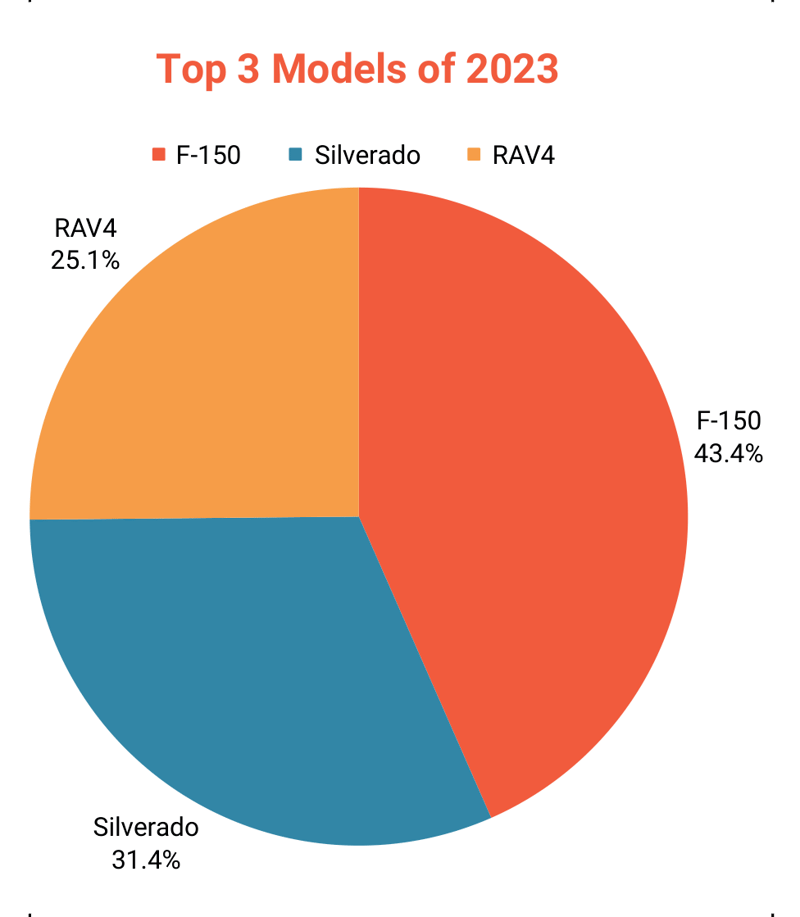
Throughout the first nine months of 2023, approximately 3% of all newly registered vehicles were F-150 trucks. Meanwhile, the RAV4 SUV also secured a 2.5% share, further reinforcing the enduring demand for SUVs.As dealerships look ahead to 2024, emphasizing durability, versatility, and advanced features in pickup truck and SUV advertising campaigns, offering attractive financing options to potential buyers, and staying attuned to evolving consumer preferences will be pivotal strategies.
How to Leverage the Consistent Appeal of Trucks & SUVs
- Use loyalty programs that reward customers for repeat purchases or referrals within the trucks and SUV segment.
- Utilize digital marketing channels to reach a broader audience.
- Recognize the significance customers place on affordability when making the purchasing decision.
- Strengthen the dealership's online presence, ensuring that the inventory of trucks and SUVs is prominently featured on the website.
- Implement e-commerce tools that enable customers to explore models, compare features, and initiate the purchase process online.
- Tailor campaigns to showcase specific models, such as Ford's F-Series or Chevrolet Silverado, and emphasize the vehicle’s strengths.
- Offer exclusive perks, discounts on accessories, or priority servicing to incentivize customers to remain loyal to the dealership for future vehicle needs.
- Targeted marketing campaigns highlighting trucks & SUVs' unique features, capabilities, versatility, safety, & advanced tech to appeal to a broad consumer base.
- Provide flexible financing options to accommodate various budgets, including extended loan terms, low down payments, and competitive interest rates.
Learn More About Automotive Market Dynamics Using the Resources Below:
02
Automotive Marketing Strategies Dealers Must Have for 2024
Data-Driven Marketing
Understanding local demographics is vital in connecting with consumers, and data analytics provides the insights needed to tailor strategies effectively. As this eBook analyzes the past year's market dynamics, it's evident that the adept use of data has become instrumental in navigating shifts in consumer behavior. Practical steps for targeted marketing are essential for translating data insights into action. From personalized campaigns to vehicle-tailored promotions, leveraging data for new and repeat customers is necessary for dealerships to excel in 2024.

Dealers must pay attention to the importance of data-driven marketing, emphasizing its role in understanding local demographics and researching practical steps for effective targeted marketing in the coming year.
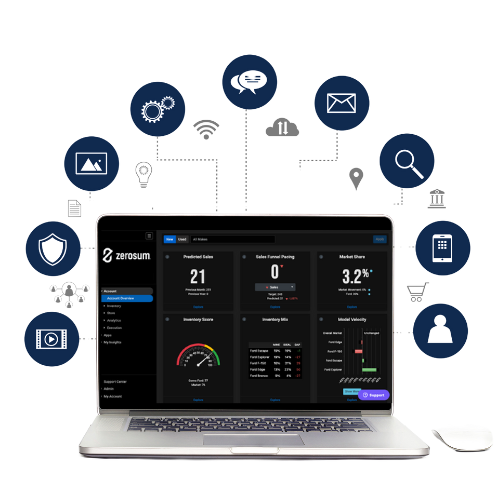
Automation & AI
In our increasingly tech-focused world, dealers and dealerships need to recognize the transformative power of automation and artificial intelligence (AI) in enhancing their marketing strategies. Automation and AI are pivotal in streamlining marketing efforts, ensuring efficient customer engagement, and optimizing advertising strategies.
Automation has become a cornerstone for dealerships aiming to enhance sales and service interactions. Integrating AI into dealership websites, exemplified by tools like ChatGPT, has become a strategic imperative. However, a cautionary note emphasizes that these tools are only as effective as the human inputs guiding them, requiring a delicate balance between automation and the human touch.

Moreover, leveraging automated advertising services like ZS's MarketAI platform allows dealerships to create efficiencies and exercise greater control over costs. The automation of advertising processes not only saves time but also opens avenues for more targeted and effective ad spending. Integrating AI and machine learning capabilities within dealer marketing strategies enables dealerships to ensure that marketing efforts reflect and are tailored to the preferences and behaviors of their target audience.
From incorporating AI tools into website interactions for both sales and service to using automated advertising services, dealerships need to explore how to harness these technologies to provide the level of service that customers have come to require.
Inventory Efficiency
As the industry looks for strategies crucial for success in 2024, a focused approach to inventory management emerges as the strategic imperative.
Efficient inventory management involves a diverse array of vehicles on the lot and a nuanced understanding of turn rates and profitability. Dealerships need to track the movement of their inventory, recognizing which models are swiftly turning over and which may require an extra marketing boost. A data-driven approach allows for timely adjustments to inventory levels, ensuring that the dealership's offerings align with the dynamic demands of their local market.
Furthermore, a deeper understanding of the profitability of each vehicle is paramount. Analyzing which models contribute the most to the bottom line enables dealerships to fine-tune their inventory mix. By aligning the available vehicles with those that yield the highest profitability, dealerships can maximize returns and enhance overall financial performance.

Data-focused automated strategies will empower dealerships to make informed decisions
From leveraging data analytics to monitor turn rates to conducting profitability analyses on various vehicle models, data-focused automated strategies will empower dealerships to make informed decisions, ensuring that their inventory not only meets consumer demands but also aligns with the financial goals of the dealership.
Customer Service Excellence
The importance of excellent customer service for revenue and relationship-building will continue in 2024 as a linchpin to dealership success. Beyond the transactional aspect of vehicle sales, the lasting success of a dealership hinges on the relationships fostered with customers. Exceptional customer service is not merely a nicety but a cornerstone for building trust, loyalty, and positive word-of-mouth referrals. Satisfied customers contribute significantly to revenue through repeat business and become brand advocates, influencing others in the market.
How A Dealership Can Secure Repeat Customers
1. Personalized Recommendations
Utilize AI algorithms to analyze customer preferences and behaviors. Provide personalized recommendations for services, maintenance, or even new vehicle options based on historical data, creating a tailored and engaging customer experience.
2. Efficient Data Management
Leverage AI for efficient data management, allowing for streamlined customer interactions. AI systems can process large datasets to identify trends, preferences, and areas for improvement, contributing to a more informed and customer-centric approach.
3. AI-Powered Appointments
Implement AI-driven systems for appointment scheduling, providing customers with seamless and efficient booking experiences. Utilize smart scheduling algorithms to optimize time slots and enhance overall convenience.
4. 24/7 Accessibility
Enhance customer service availability by leveraging AI for 24/7 assistance. AI chatbots can handle inquiries even outside business hours, ensuring that customers receive prompt responses and support whenever they engage with the dealership online.
Balancing Technology & Human Interaction
Two fundamental principles stand out as critical drivers of dealership success: the careful oversight of AI-driven tools and the enduring significance of personal interactions.

AI Oversight
The integration of AI tools like ChatGPT offer benefits in terms of efficiency and innovation. However, there is a need for human oversight. While AI algorithms hold immense potential, they are shaped by human inputs and must be monitored to mitigate biases and ensure alignment with dealership values. The strategic deployment of AI involves continuous evaluation, updates, and refinement to optimize customer engagement and satisfaction.
Personal Interactions
Personal interactions remain the cornerstone of dealership success in the digital landscape. Beyond the transactional nature of automotive commerce, customers actively seek authentic connections, trust, and expert guidance. The human touch in dealership interactions fosters a sense of rapport, cultivates customer loyalty, and goes beyond the transactional, creating positive word-of-mouth referrals and long-lasting brand advocacy.
As we navigate the automotive industry’s complexities, striking the right balance between harnessing the potential of AI-driven tools and prioritizing personalized, empathetic interactions, becomes a defining factor for dealerships. This dual approach ensures operational efficiency and a customer-centric approach that strengthens the dealership's brand and fosters enduring customer relationships.
Conclusion
Recap of 2023 Automotive Trends
- Vehicle price fluctuations
- The rise of electric vehicles.
- The critical role of data-driven marketing.
- Utilization of AI-driven tools
- Evolving consumer behavior
Advice for Dealers in 2024
Employ Actionable Strategies for Success
Dealerships are encouraged to leverage data-driven marketing for targeted campaigns, exercise caution in deploying AI tools while prioritizing human oversight, optimize inventory management for efficiency, and recognize the enduring value of personal interactions in fostering customer loyalty.

Use Proactive Adaptation as an Opportunity for Growth
ZeroSum encourages dealerships to adapt to market dynamics, embracing change as an opportunity for growth. Strategies should not merely react to trends but anticipate and shape them. A proactive stance ensures that dealerships are well-positioned for success in the dynamic landscape of 2024.
Automotive Marketing with MarketAI
ZeroSum’s MarketAI is a game-changer for car dealerships. Our technology works for thousands of dealers, collecting and organizing nationwide inventory data and turning that data into a high-performance marketing platform for dealerships all over North America. The system uses AI and ZeroSum’s billions of data points, to seamlessly connect with active shoppers on native ad channels. The platform updates daily, meaning less wasted ad spend on vehicles that have already sold.

ZeroSum’s MarketAI brings results and value to dealerships for their marketing ad spend. MarketAI's proprietary database and deep understanding of supply and demand, efficient ad campaigns, and in-market targeting make it the most effective marketing solution ever built for dealers. MarketAI is not just another marketing tool; it's a game-changer that stands head and shoulders above the competition.




